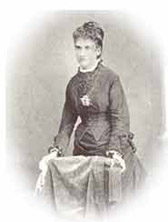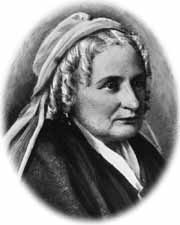“House and riches are the inheritance of fathers: but a prudent wife is from the Lord.” (Proverbs 19:14)
Men who are blessed with godly wives know that they are more valuable than gold or silver. The famous general, Robert E. Lee, knew that his wife Mary was such a woman.
Though Mary had been born with a “silver spoon”, she put God and His Word first in her life. When she would lose all of the advantages that she had been born with, she would trust in God and His righteousness and truth and follow Him bravely.
It seems a shame that the life of the one who was the inspiration to one of the greatest generals who ever lived should be so neglected. This is in part due to the fact that Mary Custis Lee lived during a time in the South when it was not considered proper for women to have their names in the papers. Fortunately, we have many fine stories about her from the letters of her friends. Her daughter, Agnes kept a vivid diary. We can also glean much from the correspondence between her and her famous husband, General Robert E. Lee.
Mary Anna Randolph Custis was born on October 1, 1808, the only surviving child of George Washington Parks Custis, grandson of Martha Washington and the adopted son of General Washington, and Mary Lee Fitzhugh Custis. As a young girl, she grew up at Arlington, former home of her renowned ancestors, George and Martha Washington.
 Robert Edward Lee proposed to Mary in the summer of 1830, and they were married at Arlington House June 30, 1831. They had seven children. The Lees had a warm and loving family life, both committed to following the Lord.
Robert Edward Lee proposed to Mary in the summer of 1830, and they were married at Arlington House June 30, 1831. They had seven children. The Lees had a warm and loving family life, both committed to following the Lord.
Mary was a godly woman. She had been blessed with a godly mother who taught her all of the womanly arts, and also the disciplines of the Spirit.
She was a gracious hostess and enjoyed having frequent visitors at Arlington. She inherited artistic ability from her father and painted delicate landscapes. She also loved gardening.
Mary was a modest woman and followed the custom of the times for Southern women by spending most of her time in domestic pursuits. She was extremely intelligent and well educated; she knew both Greek and Latin. She frequently discussed politics with both her father and husband.
Both Robert and Mary Lee had the humility that comes from the graciousness of God. Mary never allowed her wealthy background to interfere with her duty. Her husband also put duty first. Even when he was away soldiering, he would often inquire in his letters as to how the family was doing in their spiritual lives. Mary took care to always have family prayers twice daily and saw that the children read and honored the Word of God.
Like many Christian Southerners, Mary Lee taught Arlington slave women to sew, read, and write. She wanted to be sure that they could read the Scriptures on their own. She also taught Sunday School for the blacks. She was as careful about the spiritual well-being of her servants as that of her own family, and would often write about the progress they made in their lessons to Robert while he was away. Many slaves obtained eternal life under the care and tutelage of their masters. While we deplore slavery, we will make no effort to explain it’s presence, North and South, in this story. Mary Lee was faithful to the task that she inherited. She saw herself as a servant to the Lord Jesus Christ.
The Lee’s released their slaves early during the war. Many of these former slaves were loyal to the Lees and indeed many remained friends for life. They loved Mary, and felt like family. They would be a big help to Mary when the Union soldiers overran Arlington, and they were distressed when the Union soldiers went about stealing or destroying as many things as they could. The Union soldiers did not even respect the fact that Arlington was of national interest, having been the home of their beloved first president. But Arlington was the home of the former slaves and they loved it too. They rescued as many of the precious artifacts as they could, and helped Mary to move on to the home of a friend.
During her adult life, Mary developed severe rheumatoid arthritis and became increasingly debilitated as she grew older. Mary and her family often visited many spas and springs that were reputed to improve health until the War started. In letters to her husband, she tried to downplay her illness, but it worsened as the years passed. She was eventually confined to a wheelchair. In spite of all of the pain that she was in, she still managed to support the Confederate war effort by knitting hundreds of pairs of socks. In one three month knitting spree, she and her circle sent over two hundred pairs of socks for distribution to the Stonewall Brigade.
downplay her illness, but it worsened as the years passed. She was eventually confined to a wheelchair. In spite of all of the pain that she was in, she still managed to support the Confederate war effort by knitting hundreds of pairs of socks. In one three month knitting spree, she and her circle sent over two hundred pairs of socks for distribution to the Stonewall Brigade.
It broke her heart to leave her lifelong home of Arlington, but she had no choice. The Union soldiers wrecked the property, cutting down many beautiful trees. Years later, when she visited Arlington shortly before her death, she would say that she hardly recognized her old home. But, she did not let this loss keep her from quietly submitting to God’s providence.
Mary and her daughters moved between several plantations of family and friends before settling in Richmond where they spent most of the War. She continued to be an example of courage to all of the other wives, mothers, sisters, and daughters who had been sacrificing their men to the war effort. The Southerners all loved General Lee and looked to Mary Lee for leadership and guidance. Their daughter Mildred put it very well, “Yes, my Mother was a hero, as veritable a one as my Father.”
After the war ended, Mary accompanied Robert to Lexington, Virginia where he became the president of Washington College, which would later be renamed Washington and Lee University. While there, Mary would be the gracious hostess to countless young people who would visit. Though she had been raised as the heiress to Arlington, and missed it very much, she never expressed regret. She lived modestly at her new home at the college and joined her husband in his efforts to rebuild the shattered South.
Mary Anna Randolph Custis Lee died on November 5, 1873 at the age of 66. She is buried next to her husband on the Washington & Lee campus in Lexington, Virginia.
A notice in the Southern Collegian paid her a tribute, which sums up the heroic life of this courageous woman.
“Tempting as the theme is, we forbear to offer any eulogy on the character of this woman, so venerated and loved by the entire community in which she resided, related to our University — we may say linked to its history and its destiny – by so many strong and tender ties, and around whom there was gathered for years past a degree of public interest and affectionate solicitude that has never attached to any other woman in the history of our country. It is enough to say that in intelligence and in refinement of taste, in kindness of heart and attractiveness of manner, in cheerfulness under the heaviest reverses of fortune and the agonies of bodily pain, in sympathy and in benefactions towards the impoverished and suffering people of her country, in her manifold and ceaseless self-denials and labors on behalf of religion and the church of her fathers and of her choice, in all this she was an ornament to her sex, was worthy of her illustrious husband.”
Courageous in the face of the enemy, in the face of the loss of almost everything she held dear, including her heritage at Arlington, in the face of the defeat of her beloved South, in the face of debilitating illness, and eventually in the face of the loss of her dear husband, Mary willingly submitted to the Sovereignty of God. She is truly a woman worth emulating.

